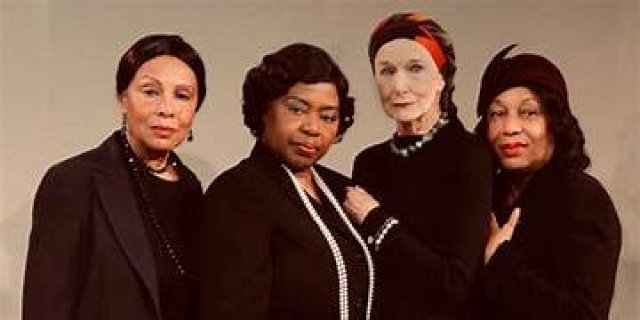New Federal Theater Telling Tales
Woodie King Jr. Directs Wesley Brown's PLay
By: Susan Hall - Nov 02, 2023
The New Federal Theater is producing a brilliant production of Wesley Brown’s play, Telling Tales Out of School. A quartet of famous and not-so-famous writers from the Harlem Renaissance, all women, three Black and one white, attend the funeral of Alain Locke.
Cunard, with Zora Neale Hurston, Jesse Redmond Fauset and Nella Larsen, are attending the funeral of a very distinguished, but not so well-known Black thinker, Alain Locke. He is considered one of the founders of the Harlem Renaissance.
Nancy Cunard, a British-American heiress, had put together a history of Black culture, 850 pages long. The joke is that you can presume to learn about Black history from a white woman. June Ballinger as Cunard is as electrifying on stage as Cunard was in real life.
Nancy has taken a suite in the Hotel Theresa. She invites the group back to the Hotel for a cup of tea and some talk after the funeral. The women edge into each other.
Woodie King Jr. directs this quartet full of surprises. Polite conversation turns more penetrating when Hurston, played by Elizabeth Van Dyke, who also created a one-woman show on the author, suggests they play a game where they dig deep into each other’s pasts.
After Round One, Hurston hints that they might drink something with a bit more color. Cunard, who was a lifelong functioning alcoholic, whips out a bottle of whiskey. The women go deeper, more truthful and mean as the whiskey takes hold.
This is 1954 and the sisterhood that would become central for many women in the 1970s has not yet emerged. One of the divisions in the Black community has always been the degree of black skin color.
Nella Larsen, whose Passing novel was recently made into a film by mixed-race Rebecca Hall, was accused of plagiarism and stopped writing. She took up nursing as a career, a path often chosen by Black women. Jesse Fauset became literary editor of Crisis, W.E.B. Dubois’ magazine created for the NAACP. On stage, Richarda Abrams as Jesse swoops around in elegant black lace. Her half-brother would find Locke’s ashes in the archives of Howard University. Locke was buried 60 years after his death in a Congressional Cemetery, a more suitable place for the first Black man to graduate from Harvard, and the first Black man to be awarded a Rhodes Fellowship.
Locke does not appear on stage, but his presence is felt. Hurston's lived life was segregated. She grew up in one of the first all-Black towns. She had no problem showing the lower end of life and using guttural language. Faucet on the other hand presented Middle class life and integration into the broader society.
Locke first developed a central debate about the position of Black culture in American culture and asks whether Black culture should be segregated (By choice) or integrated into the mainstream. Many American institutions have grabbed onto Black art after the George Floyd incident. The Whitney Museum show of Henry Taylor drawings and paintings is a well-deserved integration. Anthony Davis’ Malcolm X opera has been perfect up until now. Whether it will survive its integration into the mainstream Metropolitan Opera production, desperate for Blackness, remains to be seen.
Hurston and Cunard come off as women who are comfortable in their own complicated skins. Nella Laren and Jesse Fauset do not fare as well. Three of the women never successfully married.
Yet all four performances match each other, phrase for phrase and step by step, in this intriguing play.
Playing thru November 12. Tickets here

